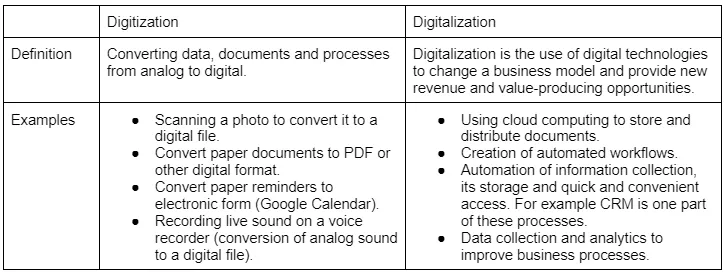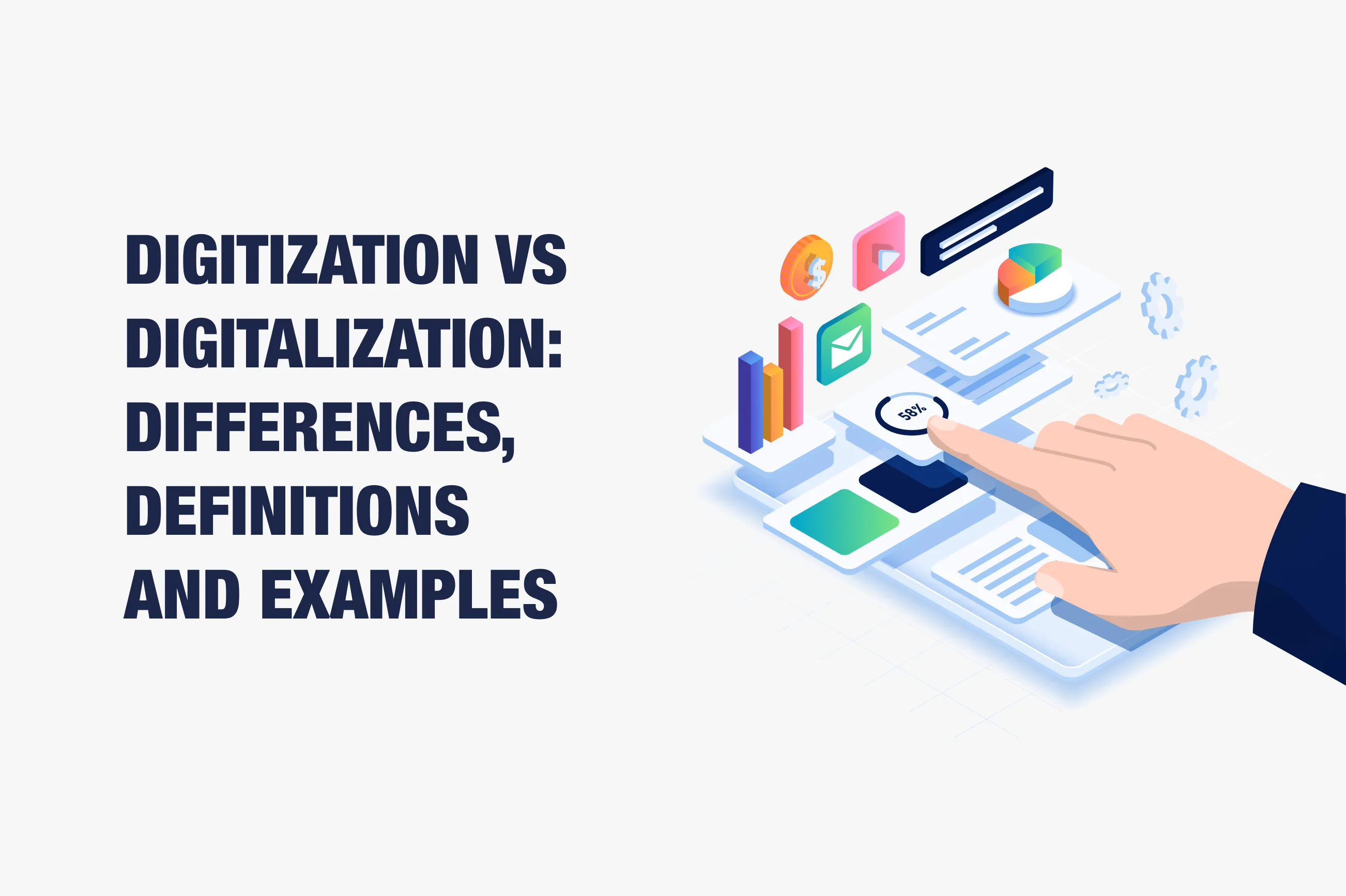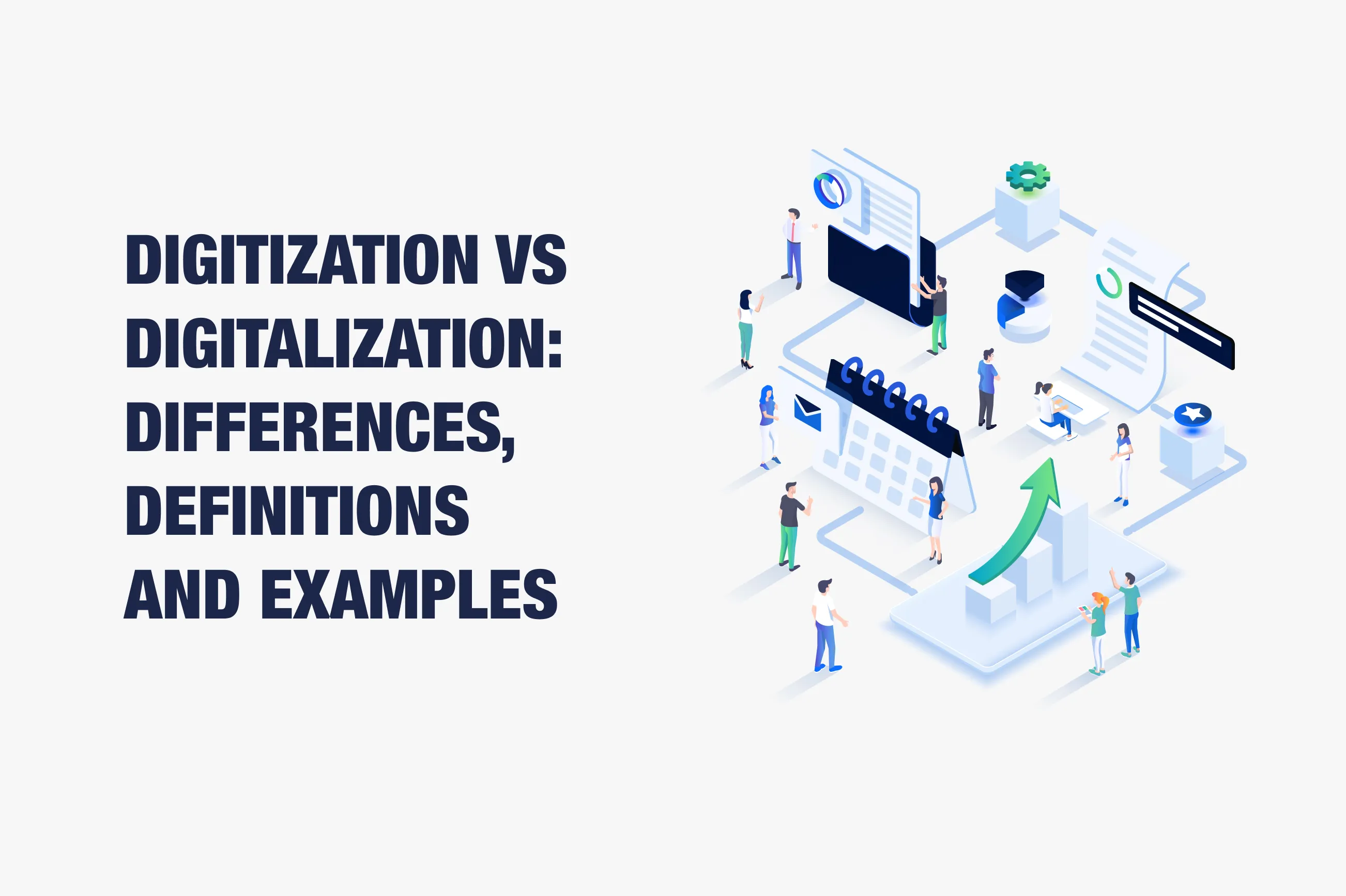Two letters decide everything when we talk about digitization and digitalization. This is not just a play on words, many still confuse these two concepts, although if you go a little deeper into this topic, the difference between them is huge. A simple understanding of the differences between these two approaches is key to today's business. The global digital transformation helps to eliminate inefficient elements of operations and increase transparency and speed of operations.
In this article, we will give you a simple yet comprehensive explanation of both digitization and digitization, as well as give examples from which it will be clear why digital transformation has such a big role in the modern world.
What is Digitization?
Digitization is the transformation of data into digital format. Digitization describes the pure analog-to-digital transformation of existing data and documents. For example, by scanning a photo, you do not change the original data, but you convert it into a digital format, bits and bytes encoded with ones and zeros.
Digitization can improve efficiency when digitized data is used to automate processes and improve accessibility, but digitization does not aim to optimize processes or data, only transformation.
What is Digitalization?
Digitalization is the optimization of business through the implementation of IT solutions and appropriate technical equipment. Such technologies help improve the company's activities in various areas: marketing, customer service, logistics, internal processes, etc.
Digitization is not just the transformation of existing data into digital form, it includes the ability of digital technologies to collect data, identify trends and make more effective business decisions.
What is the Difference Between Digitalization and Digitization?

The difference between these two concepts is enormous, and below are illustrative examples that will help you distinguish between them.
Pros of Digitalization for Business

Digitalization of business is a continuous process. You need to be prepared for the fact that, after introducing any software into the company's work, it will have to be updated and improved in accordance with new trends in the technological development market. However, retail digitalization is becoming an integral part of successful businesses, and here's why:
- Expansion of the target audience, sales channels, geography, etc.
- Automation of routine processes and simplification of some tasks.
- Increasing the level of service, which provides the client with new opportunities: fast purchase and delivery, tracking of the entire chain of product acquisition.
- Adjusting the company's activities due analytical data.
- Reducing the budget for the implementation of marketing strategies without compromising the effectiveness of promotion.
- Reducing the percentage of lost customers and minimizing errors during checkout.
- Increasing financial benefits by reducing unprofitable investments.
- A personalized approach to working with customers that increases their loyalty to the brand and improves the shopping experience.
- Chatbots for 24/7 consultations allow you to shorten the client's path from contacting to ordering a product.
- Increasing sales in offline stores with the help of new technologies.
Cons of Digitalization for Business

Despite many advantages, digitalization of business, like any other process, has certain disadvantages. In order to successfully develop your trading platform with the help of digital solutions, it is necessary to take into account the weaknesses:
- The unreadiness of certain groups of customers for the introduction of new technologies.
- The need to think in advance and make a chain of interaction with the client that will be convenient for both parties.
- Consultations in certain areas of trade, for example, when selling expensive equipment, require the presence of a live seller.
- The duration and cost of implementing digital solutions may not meet the expectations of the business owner.
Trending Digital Technologies for Business Development
Most online stores already use built-in e-commerce software. In order to stay competitive and meet customer demands, it is necessary to implement relevant digital solutions. Successful digitalization of the online platform involves the implementation of one or several technologies at once:
- Artificial Intelligence (AI)
- Augmented reality (AR)
- CRM systems
- PIM systems
- Chatbots
According to statistics, 46% of enterprises use business intelligence tools, and more than 50% of the total number of companies have implemented robotic systems for analyzing large amounts of information and customer service. In addition to them, digitalization includes many other tools that allow business development.
Digitalization of a Business: General Conclusion
Most companies already use digital technologies in their activities, combining them with each other. Systems for managing business processes or means of communication with customers are good tools for active development.
It all depends on the right approach. Therefore, if your business needs high-tech custom solutions, you can contact Owlab for advice. We are a company with many years of experience developing chatbots for instant messengers such as Telegram, Viber and WhatsApp. Also in our cases there are developments of modern CRM systems and other tools that significantly affect the business.
We hope this article was useful, if so, rate it and share it on social networks!